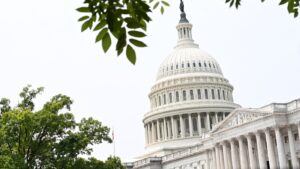Trump Mobilizes for Congressional Tax Bill amid GOP Divisions
As Congressional Republicans pursue a significant tax overhaul, President Trump is spearheading efforts to sway GOP senators in favor of a comprehensive legislative package. This bill, which encapsulates a significant portion of the Republican agenda, faces a critical juncture this month.
The “One Big Beautiful Bill Act,” recently passed in the House, is at the center of this legislative push. According to a senior White House official, Trump plans an “all-out advocacy effort” to garner Senate support. Key administration figures are expected to visit Capitol Hill to rally support, and some may even travel to states where additional persuasion is necessary. The official, who spoke on condition of anonymity, emphasized the importance of aligning Senate Republicans with the House’s proposal.
Major challenges lie ahead, as some Republican senators express concerns over the bill’s cost and potential cuts to Medicaid. While Trump insists that only “waste, fraud and abuse” would be eliminated, apprehensions remain about the impact on Medicaid coverage.
The Republican majority in both the House and Senate is slim, necessitating the use of reconciliation—a legislative process allowing passage with a simple majority rather than the typical 60-vote threshold in the Senate. This has led Trump to apply pressure through social media and direct calls to senators.
One such interaction involved Sen. Josh Hawley, R-Mo., who voiced concerns regarding Medicaid. On social media, Hawley noted, “He said again, NO MEDICAID BENEFIT CUTS,” after a conversation with Trump. Other senators Trump’s team is contacting remain unnamed, according to the official.
Although the bill narrowly succeeded in the House, any Senate modifications must be reconciled with the initial House version. “There’s not a lot of room to maneuver,” the White House official stated, emphasizing that the House framework remains crucial to the president’s goals.
Potential amendments to the bill must comply with the Byrd rule, which demands a direct connection to deficit reduction for reconciliation eligibility. This constraint requires House acceptance of Senate changes to ensure passage.
Despite frustrations with the Byrd rule, the official expressed optimism: “They’ve gotten over it in the past, and we’re hopeful they’ll get over it in the future, because the bill is not going to pass unless it’s Byrd-compliant.”







Be First to Comment